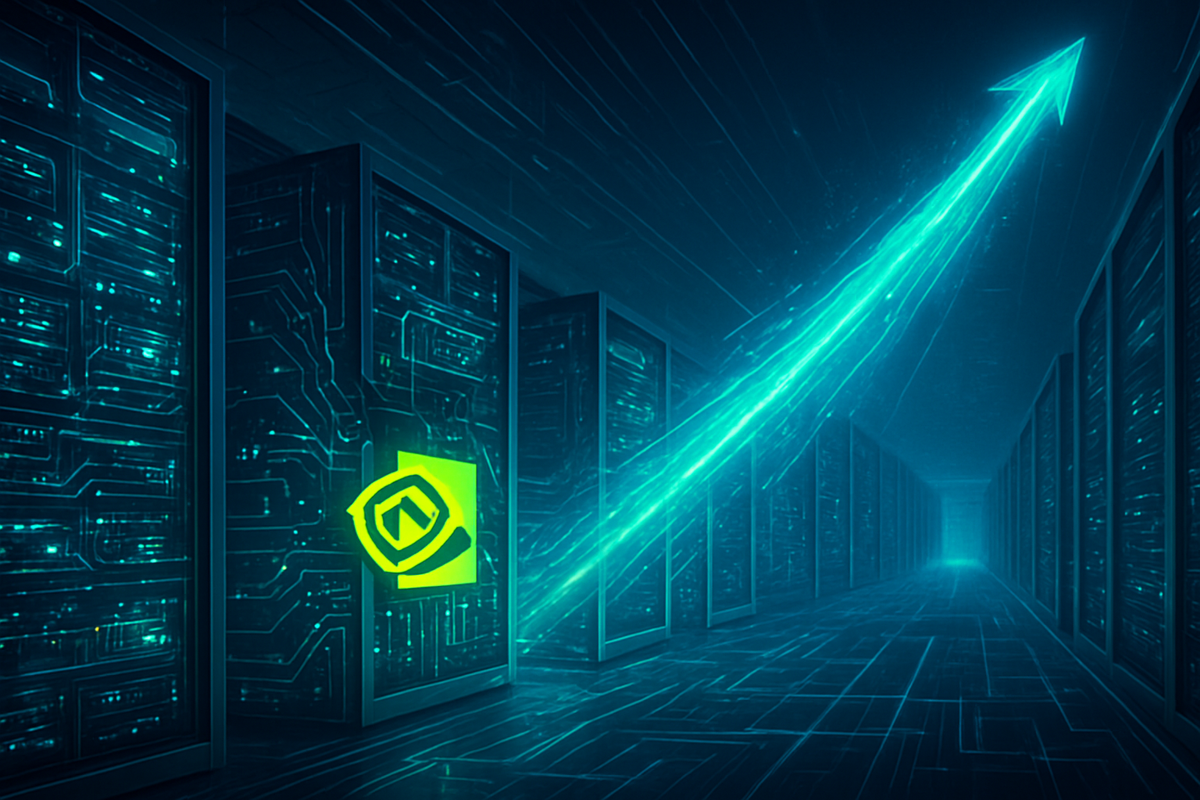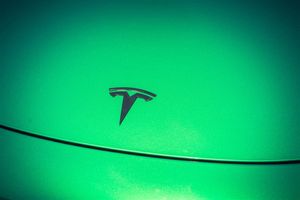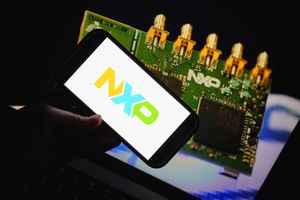Financial News
Nvidia Shatters Records with $5 Trillion Market Cap, Cementing AI Revolution Leadership

Santa Clara, CA – October 29, 2025 – In a historic moment for the technology sector, Nvidia (NASDAQ: NVDA) has officially achieved an unprecedented $5 trillion market capitalization, becoming the first publicly traded company to reach this staggering valuation. This monumental milestone, reached on Wednesday, October 29, 2025, underscores Nvidia's indispensable role as the primary architect and fuel provider for the burgeoning artificial intelligence (AI) revolution, reshaping the global financial landscape and accelerating a new era of digital transformation.
The rapid ascent to a $5 trillion valuation highlights the insatiable global demand for Nvidia's cutting-edge Graphics Processing Units (GPUs) and its comprehensive AI software ecosystem. This achievement not only solidifies Nvidia's market dominance but also signals a profound shift in how financial markets value companies at the epicenter of transformative technological change, positioning AI as the most significant innovation since the advent of the iPhone.
Nvidia's Unprecedented Ascent: A Timeline of AI Dominance
Nvidia's journey to this historic valuation has been nothing short of meteoric, marking an acceleration in growth that has stunned market observers. The company surpassed $1 trillion in May 2023, $2 trillion in March 2024, $3 trillion in June 2024, and $4 trillion in July 2025, adding a trillion dollars to its valuation in mere months. This relentless climb is directly attributable to its strategic positioning at the heart of the AI revolution, providing the foundational infrastructure for generative AI, large language models (LLMs), and advanced cloud computing.
The specific details of this achievement reveal a company operating at peak performance, driven by massive orders and strategic partnerships. Nvidia has reportedly secured an estimated $500 billion in AI chip orders over the next four years, demonstrating unparalleled demand for its hardware. Key collaborations include plans to build seven AI supercomputers for the U.S. Department of Energy, a significant partnership with Uber (NYSE: UBER) on autonomous vehicle technology, and a $1 billion investment in Nokia (NYSE: NOK) for 6G network development. Furthermore, a substantial $100 billion investment in OpenAI (Private) as part of a partnership for AI datacenters further illustrates Nvidia's critical role in the AI ecosystem.
Initial market reactions have been overwhelmingly positive, contributing to U.S. stock indices reaching record highs. However, this exuberance is tempered by concerns from global regulators, including the Bank of England and the IMF, who have warned of potential market overheating and the rapid pace of capital flows into the AI sector. Analysts are also grappling with redefined valuation metrics, with some suggesting that traditional models "simply don't apply" to a company driving such a fundamental technological shift. Nvidia's financial performance reflects this dominance, with its data center division recording record quarterly revenue, soaring to $41.1 billion in a recent quarter, up 93% year-over-year.
The AI Ripple Effect: Winners and Challengers in Nvidia's Wake
Nvidia's (NASDAQ: NVDA) $5 trillion market cap and its near-monopoly in high-end AI chips have created a significant ripple effect, carving out clear winners and presenting formidable challenges across the tech industry.
The Winners:
Several public companies are thriving in Nvidia's shadow or in direct partnership with the AI giant. Cloud Service Providers (CSPs) are major beneficiaries, as they are both Nvidia's largest customers and critical partners in deploying AI at scale. Microsoft (NASDAQ: MSFT), Amazon (NASDAQ: AMZN) (through AWS), and Google (NASDAQ: GOOGL, GOOG) (with Google Cloud) heavily integrate Nvidia's GPUs into their offerings, despite also developing their own custom AI chips. Server and infrastructure providers like Dell Technologies (NYSE: DELL), HPE (NYSE: HPE), and Supermicro (NASDAQ: SMCI) are experiencing increased demand as they build and deploy systems powered by Nvidia's GPUs. Cisco (NASDAQ: CSCO) is also benefiting by launching new networking hardware optimized for AI data centers.
High Bandwidth Memory (HBM) manufacturers are another crucial group of winners. Nvidia's advanced GPUs rely heavily on HBM, and companies like SK Hynix (KRX: 000660), Micron Technology (NASDAQ: MU), and Samsung (KRX: 005930) are seeing surging demand and pricing power for their HBM products, especially after passing Nvidia's stringent qualification tests. Furthermore, the extensive CUDA software ecosystem means that AI software and platform developers like Palantir Technologies (NYSE: PLTR), which partners with Nvidia for operational AI, and Red Hat (IBM Subsidiary), which distributes Nvidia's CUDA toolkit, are deeply integrated into the Nvidia-led AI infrastructure. Even pharmaceutical giants like Eli Lilly and Company (NYSE: LLY) are partnering with Nvidia to build AI factories for drug discovery, showcasing the broad impact. Finally, Taiwan Semiconductor Manufacturing Company (TSMC) (NYSE: TSM), as Nvidia's primary foundry, is a colossal beneficiary, dedicating substantial capacity to produce Nvidia's cutting-edge GPUs.
The Challengers and Those Facing Headwinds:
Nvidia's dominance poses significant challenges for its direct competitors in AI chip manufacturing. Advanced Micro Devices (NASDAQ: AMD), while making strides with its Instinct MI300 series, still significantly lags Nvidia in market share for data center GPUs. Intel (NASDAQ: INTC), despite its legacy in CPUs, has struggled to gain substantial traction in the high-end AI accelerator market with its Gaudi series. Numerous AI chip startups also face an uphill battle against Nvidia's entrenched ecosystem.
Furthermore, while major hyperscalers are Nvidia's customers, they are also actively working to reduce their reliance by developing in-house custom AI chips (ASICs). Amazon (NASDAQ: AMZN) (Inferentia, Trainium), Google (NASDAQ: GOOGL, GOOG) (TPUs), Microsoft (NASDAQ: MSFT) (Maia 100), and Meta Platforms (NASDAQ: META) (MTIA) are all investing heavily in their own silicon, primarily to optimize for specific workloads and control costs, particularly for inference. Apple (NASDAQ: AAPL) is also reportedly developing its own AI inference chips. This long-term trend could potentially erode some of Nvidia's market share, especially in less demanding inference tasks. Smaller AI startups and enterprises also face challenges due to the high cost of Nvidia's GPUs, which can hinder their ability to compete with larger, well-funded organizations.
The Broader AI Canvas: Trends, Regulation, and Historical Echoes
Nvidia's (NASDAQ: NVDA) ascent to a $5 trillion market capitalization is more than a corporate triumph; it's a powerful signal of the broader AI revolution's profound and pervasive impact on industry trends, geopolitical landscapes, and market dynamics. This valuation firmly places AI as a foundational technology, driving unprecedented digital transformation and a definitive shift towards accelerated computing across every sector.
The overarching industry trend is the accelerating adoption of AI. Nvidia's GPUs are not just powering data centers; they are enabling advancements in healthcare (e.g., faster medical imaging, drug discovery), autonomous driving, robotics, and finance. Its CUDA software platform further solidifies its ecosystem, making AI development more efficient and accessible. This shift towards accelerated computing, where GPUs excel at parallel processing for massive datasets, is fundamental to the AI era. Nvidia's Blackwell systems, offering comprehensive AI data center solutions, are integrating its ecosystem into critical infrastructure, driving this demand.
The ripple effects are extensive. While competitors like AMD (NASDAQ: AMD) and Intel (NASDAQ: INTC) are intensifying their efforts to capture market share, Nvidia's dominance means its partners across cloud providers, server makers, and industry-specific innovators are thriving. The supply chain, particularly TSMC (NYSE: TSM) for manufacturing and companies involved in advanced packaging, is experiencing an unprecedented boom. Nvidia is also diversifying its supply chain, deepening partnerships with U.S.-based fabs to enhance resilience and localize production.
However, Nvidia's immense market power and control over the CUDA ecosystem have inevitably attracted regulatory scrutiny. Global regulators, including the U.S. Department of Justice (DOJ), are reportedly investigating potential antitrust violations and market concentration. Concerns revolve around Nvidia's alleged promotion of exclusive chip use and its control over both hardware and software, which creates high barriers to entry. Moreover, AI chips have become a matter of national security, leading to increased government scrutiny and export restrictions, particularly impacting Nvidia's sales to China. Broader regulatory efforts are also emerging to address AI's societal impact, with calls for new approaches to manage market concentration and potential risks.
Historically, Nvidia's trajectory draws parallels to past transformative technological shifts and market concentrations. Comparisons are often made to Microsoft (NASDAQ: MSFT) in the 1990s, which dominated the PC operating system and office software markets, eventually facing antitrust investigations. Another parallel is Cisco (NASDAQ: CSCO) during the dot-com boom, which briefly became the world's most valuable company due to its dominance in networking hardware. While the current AI leaders are generally profitable, unlike many dot-com companies, the rapid escalation in prices and high market concentration (with AI-driven companies heavily influencing S&P 500 returns) raise concerns about potential overvaluation and market fatigue, echoing the speculative periods of past technology booms.
The Road Ahead: Navigating AI's Future Landscape
Nvidia's (NASDAQ: NVDA) monumental $5 trillion market cap sets a new precedent, but the journey ahead for the company and the broader AI market is dynamic and complex. Both short-term momentum and long-term strategic evolution will be critical in navigating this new landscape.
In the short-term (next 1-2 years), Nvidia is poised for continued robust growth. Demand for its Blackwell and Hopper architectures is expected to remain exceptionally strong, with significant revenue visibility from existing orders. The company's accelerated GPU development cadence, with new chips like the X100 expected in 2025, ensures a rapid response to market demands, maintaining its leadership in high-end AI training. Strategic partnerships, such as the reported $100 billion commitment with OpenAI (Private), will further solidify its position.
Long-term (beyond 2 years), Nvidia aims to transform from solely a GPU vendor into a comprehensive AI infrastructure leader. CEO Jensen Huang envisions AI opportunities becoming a multi-trillion-dollar market within the next five years, with AI infrastructure spending potentially reaching $3 trillion to $4 trillion annually by 2030. Key drivers include next-generation hardware like the Vera Rubin Superchip slated for late 2026, expansion into "AI factories" and "sovereign AI" initiatives by nations, and aggressive moves into nascent areas such as physical AI, robotics (e.g., Isaac GR00T N1 model), and the industrial metaverse (Omniverse). A strategic $1 billion investment in Nokia (NYSE: NOK) for AI-native 6G networks also signals Nvidia's intent to embed its technology into future connectivity infrastructure.
To maintain leadership, Nvidia will require strategic pivots and adaptations. This includes building an even more comprehensive full-stack AI platform, continuously investing in and expanding its software ecosystems like CUDA, Mission Control, and NeMo. Geopolitical resilience is paramount; Nvidia is adopting a dual-track strategy to comply with export restrictions for China while vigorously expanding in non-Chinese markets and localizing manufacturing. Strategic partnerships across diverse sectors, from the U.S. Department of Energy to enterprise AI companies like Palantir Technologies (NYSE: PLTR) and CrowdStrike (NASDAQ: CRWD), will broaden its market footprint. The introduction of NVLink Fusion, designed to enable custom CPUs from other companies to connect directly to Nvidia GPUs, suggests a move towards a more open, ecosystem-driven AI infrastructure.
Market opportunities are vast, driven by the broadening adoption of AI across nearly every industry and the rise of sovereign AI initiatives globally. Emerging technologies like edge AI, quantum computing integration, and advanced 6G networks offer further avenues for diversification. However, significant challenges persist. Intensifying competition from rivals like AMD (NASDAQ: AMD), Intel (NASDAQ: INTC), and Qualcomm (NASDAQ: QCOM), alongside hyperscalers developing their own custom AI chips, could erode market share. Geopolitical risks and export controls, particularly regarding China, remain a major hurdle. Supply chain dependencies on TSMC (NYSE: TSM) and valuation risk due to high growth expectations also pose potential vulnerabilities.
Potential scenarios for the AI industry range from a utopian, transformative future with world-changing breakthroughs to a more fragmented and specialized market with diverse hardware and software providers. A scenario of uneven distribution, where AI access is limited to a few powerful entities, is also a possibility. Technological advancements will focus on multi-modal AI, efficient smaller models, synthetic data generation, and edge AI. Economically, AI is projected to add trillions to the global economy, transforming job markets and necessitating workforce reskilling.
The AI Revolution's Enduring Legacy: A Concluding Assessment
Nvidia's (NASDAQ: NVDA) historic achievement of a $5 trillion market capitalization on October 29, 2025, is far more than a financial milestone; it is a powerful declaration of the artificial intelligence revolution's profound and enduring impact. This valuation firmly establishes Nvidia as the foundational infrastructure provider for the AI age, a role that will continue to reshape industries, economies, and societies for decades to come.
The key takeaway from this event is the indisputable acceleration of AI adoption across all sectors. Nvidia's unparalleled dominance in high-performance AI chips and its robust CUDA software ecosystem have created a virtuous cycle of innovation and demand. The company's strategic vision, from aggressive hardware roadmaps (Blackwell, Rubin) to comprehensive full-stack AI platforms and diversification into new areas like robotics and sovereign AI, positions it for sustained leadership.
Moving forward, the market will continue to be driven by an insatiable demand for AI compute. Investors should watch for several critical factors: Nvidia's ability to navigate geopolitical tensions and export controls, the success of its strategic partnerships with hyperscalers and industry innovators, and its capacity to maintain its technological edge against intensifying competition from AMD (NASDAQ: AMD), Intel (NASDAQ: INTC), and in-house chip development by major cloud providers. The evolution of AI regulation and its impact on market concentration will also be a significant determinant of the industry's trajectory.
Ultimately, Nvidia's $5 trillion valuation signifies that AI is not merely a transient technological trend but a fundamental shift driving a new industrial revolution. While challenges related to competition, supply chain resilience, and market valuation persist, Nvidia's role as the engine of AI innovation suggests it will remain a critical force in shaping the future of technology and global economic growth.
This content is intended for informational purposes only and is not financial advice
More News
View More




Recent Quotes
View More
Quotes delayed at least 20 minutes.
By accessing this page, you agree to the Privacy Policy and Terms Of Service.



